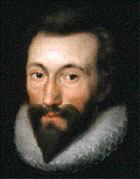 |
John Donne (1572 – 1631) was an English poet, satirist, lawyer and a cleric in the Church of England. He is considered the pre-eminent representative of the metaphysical poets. |
John Donne was the most outstanding of the English Metaphysical Poets and a churchman famous for his spellbinding sermons. His poetry is noted for its ingenious fusion of wit and seriousness and represents a shift from classical models toward a more personal style. Donne was born in London to a prominent Roman Catholic family but converted to Anglicanism during the 1590s. At the age of 11 he entered the University of Oxford, where he studied for three years. According to some accounts, he spent the next three years at the University of Cambridge but took no degree at either university.
He began the study of law at Lincoln’s Inn, London, in 1592, and he seemed destined for a legal or diplomatic career. In 1596, Donne joined the naval expedition that Robert Devereux, 2nd Earl of Essex, led against Cádiz, Spain. On his return to England, Donne was appointed private secretary to Sir Thomas Egerton, Keeper of the Great Seal, in 1598. Donne’s secret marriage in 1601 to Egerton’s niece, Anne More, resulted in his dismissal from this position and in a brief imprisonment. The poet, in a characteristic pun, later summed up the experience: “John Donne, Anne Donne, Undone.” During the next few years Donne made a meager living as a lawyer, serving chiefly as counsel for Thomas Morton, an anti-Roman Catholic pamphleteer. Donne may have collaborated with Morton in writing pamphlets that appeared under Morton’s name from 1604 to 1607.
Donne’s principal literary accomplishments during this period were Divine Poems (1607) and the prose work Biathanatos (c. 1608, posthumously published 1644), a half-serious extenuation of suicides, in which he argued that suicide is not intrinsically sinful. In 1608 a reconciliation was effected between Donne and his father-in-law, and his wife received a much-needed dowry. His next work, Pseudo-Martyr (1610), is a prose treatise maintaining that English Roman Catholics could, without breach of their religious loyalty, pledge an oath of allegiance to James I, king of England. This work won him the favor of the king. Donne became a priest of the Anglican church in 1615 and was appointed royal chaplain later that year.
In 1621 was named dean of St. Paul’s Cathedral. He attained eminence as a preacher, delivering sermons that are regarded as the most brilliant and eloquent of his time. Donne’s poetry embraces a wide range of secular and religious subjects. He wrote cynical verse about inconstancy (for example, Go and catch a falling star and I can love both fair and brown); poems about true love, such as The Good-Morrow and Sweetest love, I do not go/For weariness of thee; Neoplatonic lyrics on the mystical union of lovers’ souls and bodies, such as Air and Angels and The Ecstasy; brilliant satires; hymns and holy sonnets depicting his own spiritual struggles, such as A Hymn to God the Father, Batter my heart, three-personed God, and I am a little world made cunningly, in which he begs God to purge him of sin.
The Sermons, some 160 in all, are especially memorable for their imaginative explications of biblical passages and for their intense explorations of the themes of divine love and of the decay and resurrection of the body. Paradoxes and Problems (c. 1598) is a collection of playful demonstrations (for example, “A Defence of Women’s Inconstancy” and “Why Puritans Make Long Sermons”). In Ignatius His Conclave (c. 1610), satirizing the Jesuits, Loyola is ejected from hell and ordered to colonize the moon, where he will do less harm.
Devotions upon Emergent Occasions (1624) is a powerful series of meditations, expostulations, and prayers in which Donne’s serious sickness at the time becomes a microcosm wherein can be observed the stages of the world’s spiritual disease. The work includes the celebrated reflection on the meaning of a distant funeral bell: No man is an Iland, intire of it selfe; ¦ any man’s death diminishes me, because I am involved in Mankinde; and therefore never send to know for whom the bell tolls; It tolls for thee. Donne was fully prepared for his own death. Having left his sickbed to deliver his last sermon, fittingly entitled “Death’s Duel,” he then returned home to pose for his portrait in a funeral shroud. He died a month later.
John Donne Poems
- A Hymn To Christ
- A Hymn To God The Father
- Aire and Angels
- Community
- Death Be Not Proud
- Father, Part Of His Double Interest
- For Whom The Bell Tolls
- Go And Catch A Falling Star
- Holy Sonnet ?
- Holy Sonnet XIV
- Hymn To God, My God In My Sickness
- O My Black Soul! Now Art Thou Summoned
- Song: Soul’s Joy Now I Am Gone
- The Computation
- The Dissolution
- The Sun Rising
- The Undertaking
- The Will
Other Links
- John Donne Poems
- British Poets– collection of British Poets from Geoffrey Chaucer to the present time
- Metaphysical Poets– Includes other metaphysical poets such as George Herbert and Henry Vaughan
- 16th Century Poets
- The Great Poets– A comprehensive collection of poetry from around the world
- John Donne at Luminarium, biographical sketches and selected works by John Donne
- Extensive Biography of John Donne
Selected Bibliography of John Donne Poems
Satires (1593)
Songs and Sonnets (1601)
Divine Poems Divine Poems (1607)
Psevdo-Martyr (1610)
Ignatius his Conclaue (1611)
An Anatomy of the World (1611)
The Second Anniuersarie. Of The Progres of the Soule (1611)
An Anatomie of the World (1612)
Devotions Upon Emergent Occasions (1624)
Deaths Dvell (1632)
Ivvenilia (1633)
Poems (1633)
Sapientia Clamitans (1638)
Wisdome crying out to Sinners (1639)
